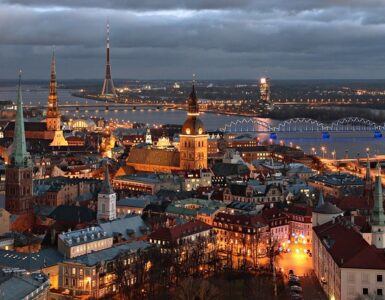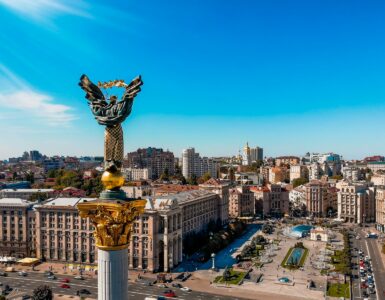NOTABLE DEALS
Russian social media giant VK is selling its subsidiary My.Games to Alexandr Chachava, the managing partner of LETA Capital, for $642 million according to RB.ru. VK was reportedly looking for a buyer after the U.S. imposed sanctions over VK’s CEO Vladimir Kirienko, the son of Sergey Kirienko, the head of Russian presidential administration. My.Games was the biggest source of VK’s income from overseas sales. [Source: RB.ru]
Impact Lab, a Russian startup developing tools for charity initiatives, raised $250,000 from an investment fund Zerno Ventures. The platform develops features for mobile games, through which gamers can support a charity cause when playing while the startup earns a commission from each transaction. The money will be spent on the improvement of Impact Lab capabilities and expansion. [Source: Telegram channel Russian Venture]
An Estonia-based startup 3Commas launched by Russian founders in 2017, attracted a $37 million investment from an investment fund Target Global, CEO and founder of Britain-based Copper company Dmitry Tokarev and other investors. The startup that develops an automated crypto trading bot platform will spend the money on the expansion of its ecosystem and improving machine learning and artificial intelligence algorithms. [Source: Tech.eu]
Russian venture fund Vibranium VC invested in British startup IVM Markets with Russia-origin founders Ildar Farkhshatov, Vlad Gubsky, and Maxim Lozhevsky in a $4 million round led by venture fund Geekdom. IVM Markets is developing SaaS solutions for financial services providers and resellers, the investments will be spent on automation and opening an office in the U.S. [Source: Telegram channel Russian Venture]
WAR-DRIVEN RELOCATION
Russia will face a massive exodus of IT specialists due to the military mobilization as a significant part of them would be eligible to serve, with up to 100,000 expected to leave the country. Optimistic experts think the accelerated brain drain will not do much harm to the industry as staff performing critical operations and holding key management positions is not subject to the mobilization. [Source: RBC]
Demand for crypto currencies and crypto wallets has significantly increased as more Russians are seeking ways to guard their money following Russia’s partial military mobilization to support the country’s invasion of Ukraine. Stablecoin USDT was of special interest, which drove its price up against the ruble at p2p trade sections of crypto exchanges such as Binance and Garantex. [Source: Kommersant]
Apple is reportedly relocating its Russian staff to other countries, including Kyrgyzstan, United Arab Emirates, and the United Kingdom. One of sources says the company was preparing the relocation since spring this year. [Source: Cnews]
CIS INNOVATION
The Uzbekistan’s government has launched a web-portal for scientists working in the country’s scientific establishments and high schools. The website contains databases that can be used for research and studies, lists of various scientific establishments, conducted researches, grants, events, and cooperation programs with scientists from other countries. [Source: Yuz.uz]
Azerbaijan is going to become a digital hub for the region, a top government official said at an international conference. The country’s government will guarantee Internet access in all areas by 2024, and is now building infrastructure for computing technologies, national e-signature as well as pursuing education of IT specialists. [Source: Trend.az]
Kazakhstan will use a concept of a so-called “invisible government” assuming that the government is offering state services to citizens in need proactively instead of just reacting to their requests, the country’s President Kasym Zhomart Tokaev said at an international technological forum. At the moment, citizens have an online access to 90% of state services, one of highest rates in the world, Tokaev said, adding that the government seeks to use digital technologies for enhancing living standards. [Source: E-CIS]
Russia has kept its place in the Global Innovation Index (GII) 2022 and was ranked 47th (47th in 2020, 45th in 2021) despite the Ukraine war sanctions. Russia has performed well in the “Human capital and research” category (ranked 27th) and had a lower ranking in “Institutions” (89th). [Source: Kommersant]
Uzbekistan, a newcomer to GII, placed 82nd and was among 26 countries that outperformed “innovation relative to their development.” The report said the country placed “among the top three economies for the Central and Southern Asia region.” [Source: the World Intellectual Property Organization]
EDUCATION
Alfa Factory, a subsidiary of Russia’s Alfa Bank, will launch a three-month free course on IT architecture for students and recent graduates. The participants will create applications on a low-code platform, and the best students will be offered a job at the bank. [Source: RB]
Short video clips platform TikTok and Kazakhstan-based Astana Hub will launch TikTok StartUp Academy for Kazakhstan startups in mid-October. The Academy will educate founders and managers of IT startups on how to promote their businesses through video. [Source: Profit.kz]
TELECOMMUNICATIONS
Rostech, a Russian state-run corporation, will be manufacturing land-based tropospheric communication systems. Stations that use the troposphere for transferring radio signals are often the only way to deliver mobile and Internet service to distant areas. [Source: Rostech]
Restructuring at Roskomsos: the Russian state-run space corporation will have two new divisions. One will be charged with providing paid space services for external clients, while the other to produce electronic components for satellites as the corporation seeks to increase satellite production. Roskosmos will also lay off 10% of its headquarters staff. [Source: Izvestia]
SCIENCE
Physicists and mathematicians of Russia-based the Ural Federal University and UK-based the Manchester University have created a mathematics model for counting the number of virus’s particles in a human cell. The model allows to calculate a needed amount of medicine with higher accuracy. [Source: Scientific Russia]
Scientists of the Perm National Research Polytechnic University have invented a method to extract indium (In) from waste products of an electronics manufacturing industry. By extracting up to 70% of the initial amount, the invention makes it possible to recycle the element thus reducing a negative impact on the environment and cutting production costs. [Source: Scientific Russia]






Add comment